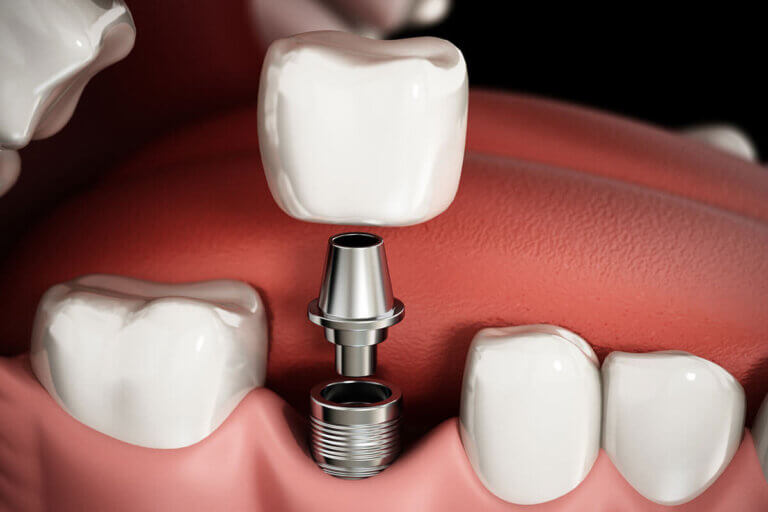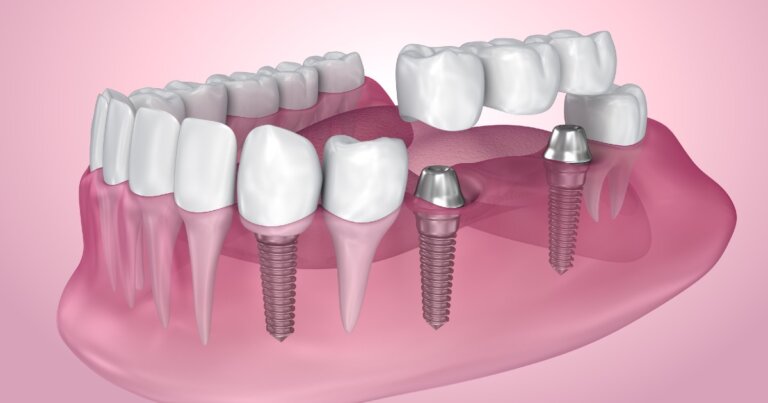Fallen Out Dental Implant Crown

What Is A Fallen Out Dental Implant Crown?
A Dental Implant Crown is a prosthetic tooth attached to a titanium post surgically placed into the jawbone. The titanium implant serves as a strong, stable root, while the crown mimics the look and function of a natural tooth. While implant crowns are designed for durability and can last decades with proper care, there are instances where they may loosen or detach.
If you’re dealing with a fallen out dental implant crown, you’re not alone. Dental implant crowns are a durable and effective solution for missing teeth, but occasionally, these crowns may loosen or fall out due to various reasons. Before you contact a Toronto dentist to examine A Fallen Out Dental Implant Crown, there are some things you should know as a patient:
- Why Did My Dental Implant Crown Fall Out?
- Signs And Symptoms Of A Dental Implant Crown Falling Out
- Treatment Options For A Fallen Out Dental Implant Crown
- Managing A Fallen Out Dental Implant Crown Until You Can See The Dentist
- Frequently Asked Questions About Fallen Out Dental Implant Crowns
If you have questions about A Fallen Out Dental Implant Crown or other dental problems, please contact us for more information.
Why Did My Dental Implant Crown Fall Out?
Understanding the reason behind a fallen out dental implant crown can help guide the appropriate treatment. Here are some common causes:
- Screw Loosening: The dental crown attaches to the implant post via a small screw. If this screw was not tightened with enough torque during placement—typically requiring about 15 newton-centimeters—it may gradually loosen over time, resulting in the crown detaching.
- Prosthetic Misfit: A poor fit between the crown and implant post can prevent a secure attachment. This misalignment may be due to manufacturing errors or inaccurate placement, leading to a wobbly or detached crown.
- Failed Osseointegration: Osseointegration is the fusion of the implant post with the jawbone. Failure in this process can cause the implant to loosen. Factors like smoking, inadequate oral hygiene, osteoporosis, or other health issues can impede successful osseointegration.
- Trauma or Injury: Physical trauma, such as a fall or sports injury, can dislodge a dental implant crown. Even minor incidents can shift the crown if enough force is applied.
Your dentist can help you diagnose the cause and provide the necessary treatment to restore your implant crown. If you have further questions about A Fallen Out Dental Implant Crown, please contact us.
Signs And Symptoms Of A Dental Implant Crown Falling Out
If your implant crown is loose or has fallen out, you may notice these signs:
- Visible Gap: A visible space where the crown used to be or exposure of the implant post.
- Loose Crown: A crown that feels wobbly or insecure before fully detaching.
- Discomfort or Pain: Discomfort, sensitivity, or pain around the implant area, especially with temperature changes.
- Altered Bite or Chewing: Difficulty biting or chewing on the affected side, with food getting trapped in the gap.
- Swelling or Inflammation: Gum redness, swelling, or tenderness around the implant site.
If you experience any of these symptoms, contact your dentist immediately. Prompt intervention can prevent further complications. If you have further questions about signs or symptoms of A Fallen Out Dental Implant Crown, please contact us.
Treatment Options For A Fallen Out Dental Implant Crown
After identifying the cause, your dentist can recommend suitable treatments, including:
- Implant Crown Reattachment: If the crown is undamaged, it may be possible to clean and reattach it to the implant post using a new screw or adhesive.
- Crown Replacement: For damaged or irreparable crowns, a replacement crown can be made. This process involves taking impressions of the implant site to fabricate a new, perfectly fitted crown.
- Implant Replacement: If the implant itself is damaged or infected, it may need to be removed and replaced. In cases of significant bone loss, your dentist may suggest bone grafting to ensure stability before placing a new implant.
- Screw Replacement: Sometimes, only the attaching screw may need replacing. This is a straightforward procedure, provided the crown and implant are both in good condition.
Your dentist will recommend the appropriate treatment based on the cause and severity of the fallen out dental implant crown. If you have further questions about treatment options for A Fallen Out Dental Implant Crown, please contact us.

Managing A Fallen Out Dental Implant Crown Until You Can See The Dentist
If your implant crown falls out and you can’t see a dentist right away, take these steps to protect the site:
Store the Crown Safely: If the crown has detached fully, keep it safe in a clean container to prevent damage or loss. Bring it with you to your appointment.
Maintain Cleanliness: Gently brush around the implant site and rinse with a saltwater solution or mouthwash to prevent infection and inflammation. A Waterpik can be especially useful here.
Avoid Chewing on the Affected Side: Try to avoid chewing on the side with the missing crown to prevent further irritation or damage.
Manage Pain with Over-the-Counter Medication: Over-the-counter pain relief, such as ibuprofen or acetaminophen, can help with discomfort. Follow dosing instructions carefully and consult your doctor if you have any health conditions.
It’s important to see your dentist as soon as possible to receive professional treatment for a fallen out dental implant crown. In the meantime, these tips can help manage the situation and minimize discomfort. If you have further questions about managing A Fallen Out Dental Implant Crown, please contact us.
Frequently Asked Questions About Fallen Out Dental Implant Crowns
- How long should a dental implant crown last?
With proper care, dental implant crowns can last 10-15 years or longer, depending on factors like oral hygiene, lifestyle habits, and regular dental care.
- Can I reattach the crown myself?
No, attempting to reattach the crown yourself can lead to improper fitting or infection. It’s best to see a dental professional for safe reattachment.
- Is it normal for an implant crown to feel slightly loose?
Slight movement may be possible due to the surrounding gum tissue, but if your crown feels significantly loose, it’s advisable to consult your dentist.
- Can a loose implant crown lead to infection?
Yes, if left untreated, bacteria can accumulate around the loosened implant crown, potentially leading to infection or peri-implantitis.
By following these tips, you can help prevent a dental implant crown from falling out and maintain the health and stability of your dental implant for years to come. If you have further questions about how to prevent an Dental Implant Crown from falling out, please contact us.

